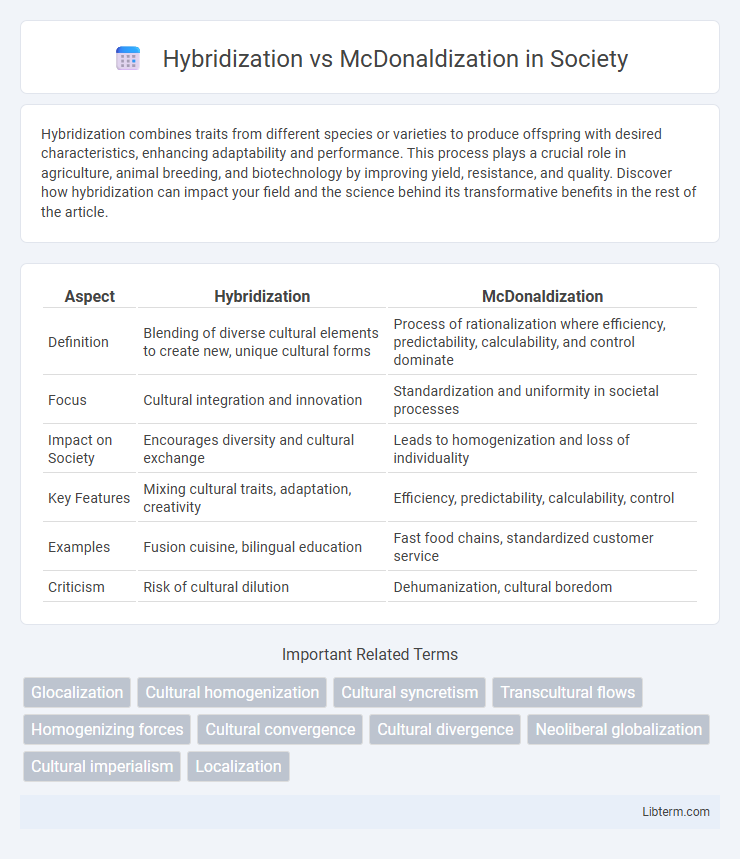Hybridization combines traits from different species or varieties to produce offspring with desired characteristics, enhancing adaptability and performance. This process plays a crucial role in agriculture, animal breeding, and biotechnology by improving yield, resistance, and quality. Discover how hybridization can impact your field and the science behind its transformative benefits in the rest of the article.
Table of Comparison
| Aspect | Hybridization | McDonaldization |
|---|---|---|
| Definition | Blending of diverse cultural elements to create new, unique cultural forms | Process of rationalization where efficiency, predictability, calculability, and control dominate |
| Focus | Cultural integration and innovation | Standardization and uniformity in societal processes |
| Impact on Society | Encourages diversity and cultural exchange | Leads to homogenization and loss of individuality |
| Key Features | Mixing cultural traits, adaptation, creativity | Efficiency, predictability, calculability, control |
| Examples | Fusion cuisine, bilingual education | Fast food chains, standardized customer service |
| Criticism | Risk of cultural dilution | Dehumanization, cultural boredom |
Understanding Hybridization in Global Culture
Hybridization in global culture refers to the blending of diverse cultural elements, creating new, hybrid forms that challenge traditional boundaries and promote cultural innovation. This process contrasts with McDonaldization, which emphasizes uniformity, efficiency, and standardization in cultural consumption and practices. Understanding hybridization highlights the dynamic nature of cultural exchange, where local identities adapt and merge with global influences, fostering creativity and cultural diversity.
Defining McDonaldization: Key Concepts
McDonaldization refers to the process by which principles of fast-food restaurants, such as efficiency, calculability, predictability, and control, dominate other sectors of society and organizations. This concept, introduced by sociologist George Ritzer, emphasizes homogenization and standardization aimed at maximizing output and minimizing human variability. Key strategies include streamlining tasks, replacing human effort with technology, and setting uniform standards to ensure consistent consumer experiences worldwide.
Historical Roots of Hybridization and McDonaldization
Hybridization traces back to cultural and postcolonial studies in the late 20th century, emphasizing the blending of diverse cultural elements to create new, syncretic forms. McDonaldization, a concept introduced by sociologist George Ritzer in 1993, draws on Max Weber's theory of rationalization, highlighting the process where efficiency and predictability dominate social life through standardized, corporate practices. Both concepts emerged from critical examinations of globalization, with hybridization focusing on cultural mixing and McDonaldization on organizational homogenization.
Major Differences Between Hybridization and McDonaldization
Hybridization refers to the blending of cultures, ideas, or practices to create new, diverse forms, emphasizing cultural exchange and integration, while McDonaldization focuses on the process of rationalization characterized by efficiency, calculability, predictability, and control, often leading to homogenization. The major difference lies in hybridization fostering diversity through synthesis of elements, whereas McDonaldization promotes standardization and uniformity to maximize efficiency. Hybridization values cultural adaptation and creativity, whereas McDonaldization prioritizes streamlined processes and replicability across different contexts.
Real-World Examples of Hybridized Cultures
Hybridization manifests in real-world examples like fusion cuisines blending traditional flavors with global ingredients, such as Korean tacos combining Mexican and Korean culinary elements. McDonaldization, by contrast, emphasizes standardization and efficiency, evident in global fast-food chains replicating identical menus and service models worldwide. Cities like Tokyo illustrate hybridization by integrating Western architectural styles with traditional Japanese designs, creating unique cultural landscapes.
The Spread of McDonaldization in Modern Societies
The spread of McDonaldization in modern societies reflects a process where efficiency, calculability, predictability, and control through technology dominate social institutions and consumer behavior. This phenomenon contrasts with cultural hybridization, which emphasizes the blending and coexistence of diverse cultural elements rather than the homogenization characteristic of McDonaldization. The global expansion of fast-food chains exemplifies McDonaldization's influence, shaping not only consumption patterns but also workplace organization and social interactions worldwide.
Impacts on Local Traditions and Authenticity
Hybridization blends global and local cultural elements, creating new, dynamic traditions that preserve authenticity while adapting to modern influences. McDonaldization prioritizes efficiency, predictability, and uniformity, often eroding local customs and reducing cultural diversity by imposing standardized practices. The impact on local traditions is profound: hybridization fosters cultural innovation and resilience, whereas McDonaldization risks homogenization and loss of unique cultural identities.
Economic and Social Effects of Both Phenomena
Hybridization fosters cultural exchange and economic diversification by blending global and local elements, leading to increased market innovation and consumer choice, while promoting social inclusivity and multicultural identities. McDonaldization drives economic efficiency and standardization through mass production and uniformity, which can reduce cultural uniqueness and create social homogenization, often prioritizing profit over social values. The economic impact of hybridization encourages adaptive growth in global markets, whereas McDonaldization accelerates consumerism but risks diminishing social diversity and local economic resilience.
Criticisms and Controversies Surrounding Each Approach
Hybridization faces criticism for oversimplifying the blending of cultures, often underestimating power imbalances and the dominance of Western influences. McDonaldization is controversial for promoting homogenization, reducing cultural diversity by emphasizing efficiency, calculability, predictability, and control. Both approaches are debated for their implications on cultural identity, with Hybridization accused of ignoring cultural resistance and McDonaldization criticized for fostering consumerism and dehumanization.
Future Trends: Towards More Hybrid or McDonaldized Worlds?
Future trends indicate an increasing convergence of hybridization and McDonaldization, where cultural exchange and global standardization co-evolve. Hybridization drives innovation through blending diverse cultural practices, while McDonaldization emphasizes efficiency, predictability, and control in global systems. Emerging technologies and consumer demands are likely to accelerate both processes, resulting in worlds that balance unique hybrid identities with streamlined, uniform experiences.
Hybridization Infographic

 libterm.com
libterm.com